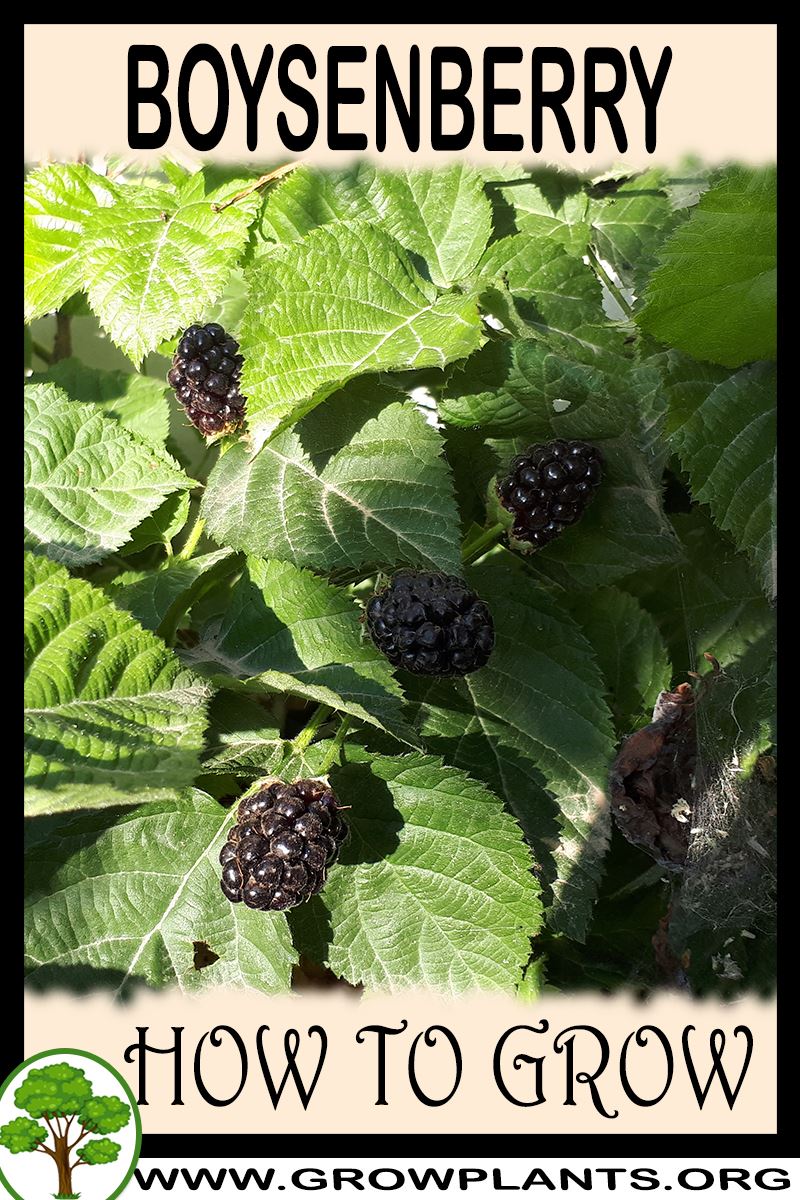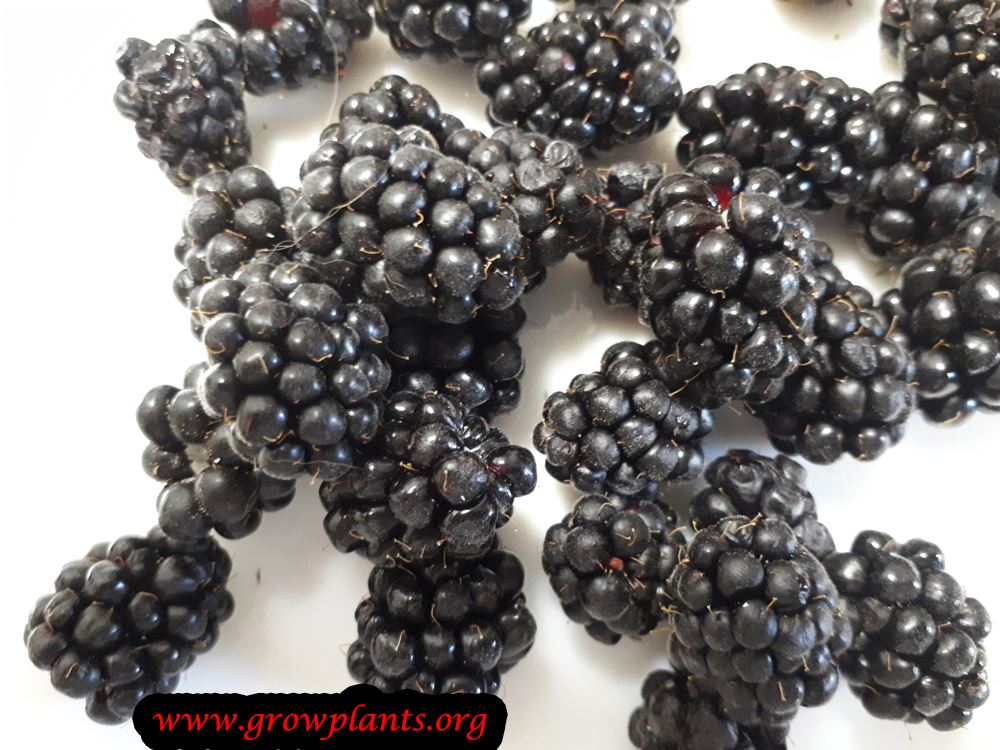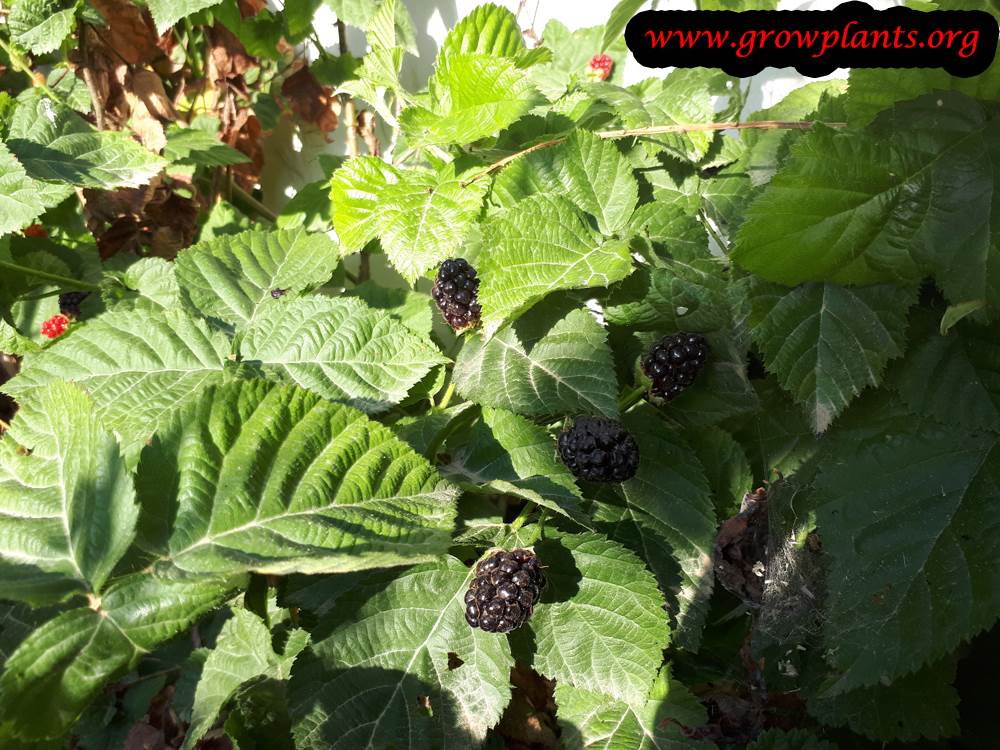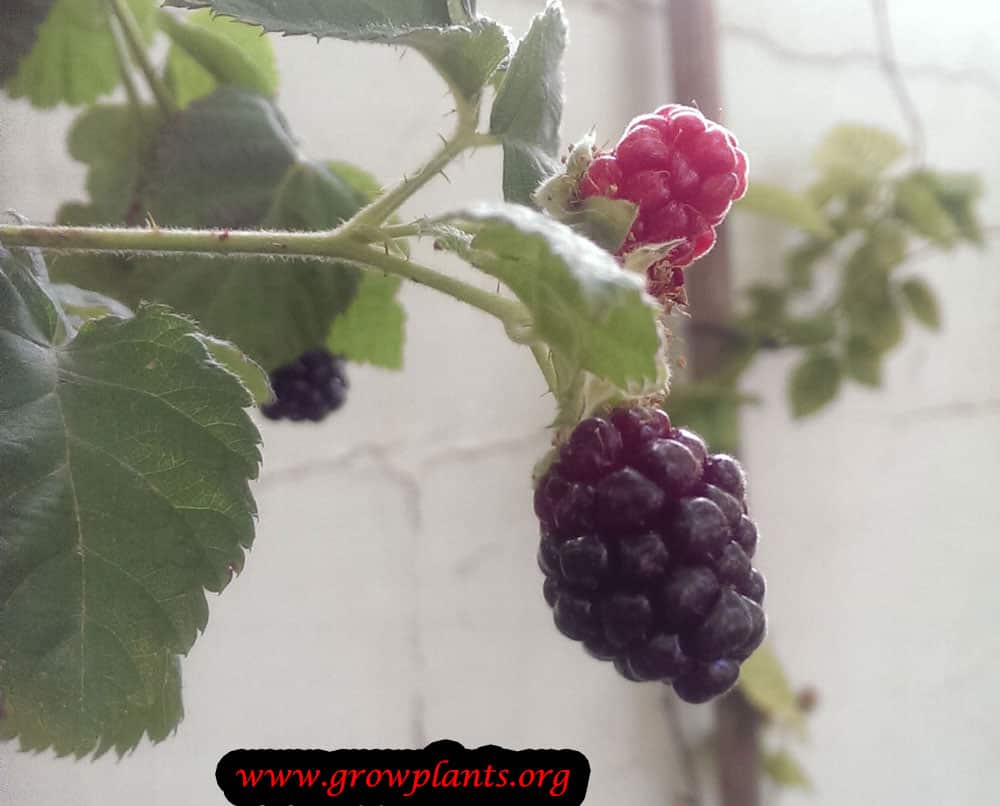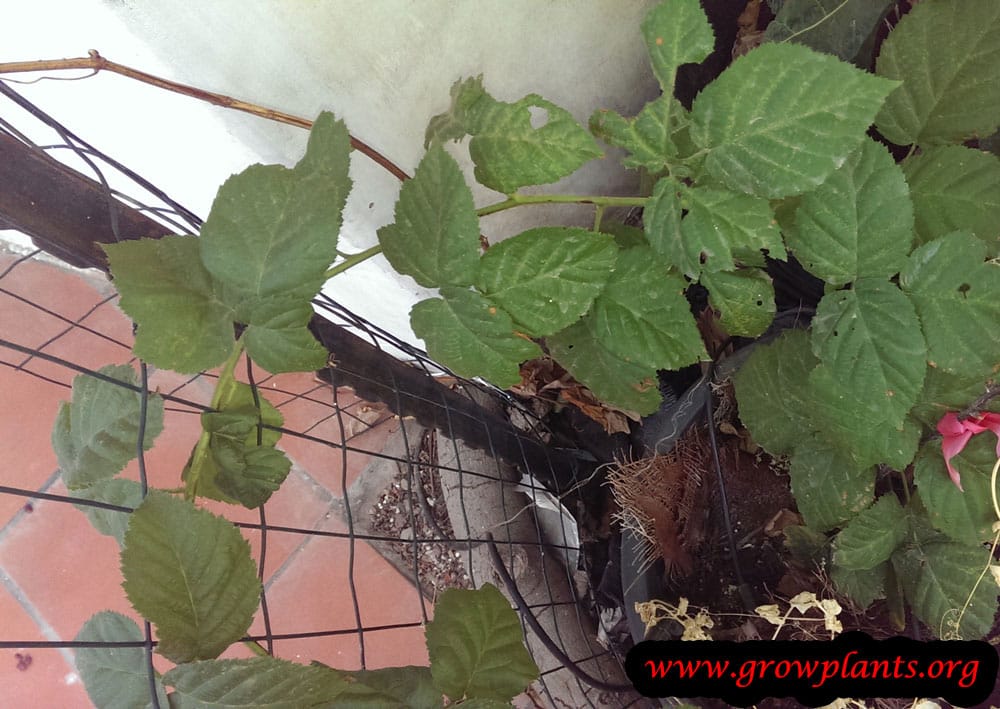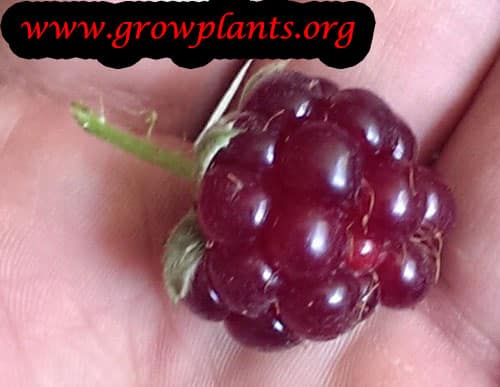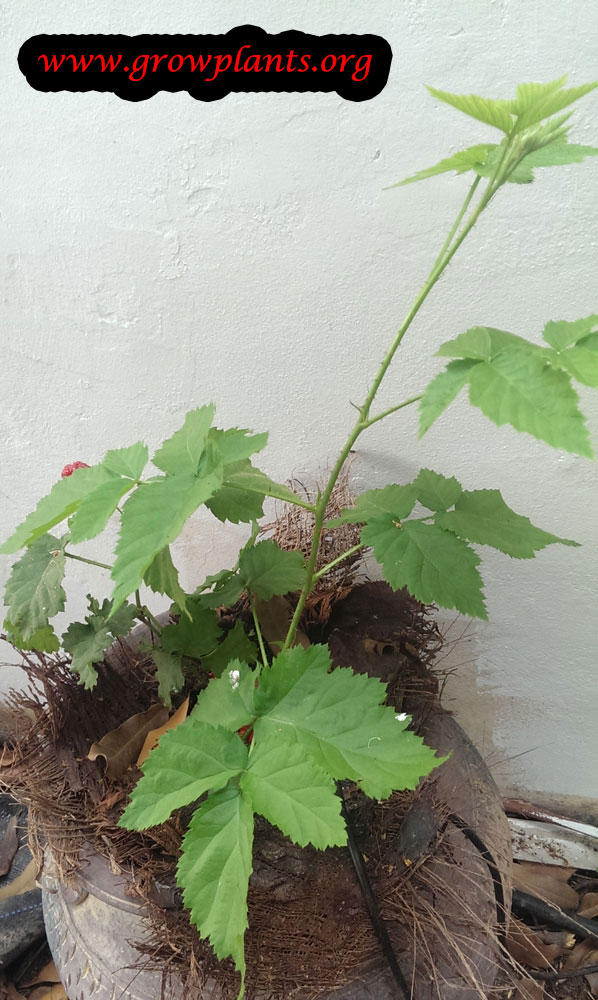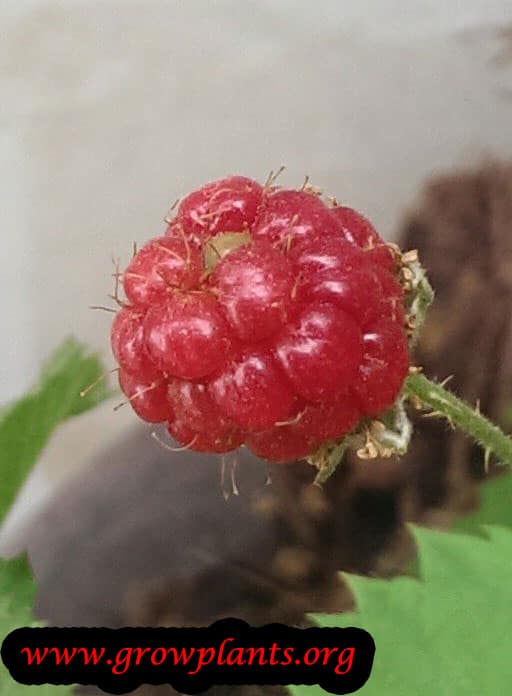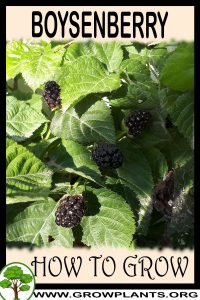
Boysenberry plant grow and care – vine but can be design to shrub of the genus Rubus also known as Boysenberries, it is a cross human hybrid between few Rubus species, Boysenberry perennial deciduous but in warmer climate can grow evergreen plant, grow for the edible fruits and also can be used as hedge plant, can grow in temperate, subtropical or mediterranean climate and growing in hardiness zone 6-10 and with right care in hardiness zone 11a
Leaves color green in heart shape, leaves grow connected together, the plant has thorns and rarely can be without thorns
Flower color white flower sometimes a little bit purplish, 1-3 cm, with 5 petals
Boysenberry edible fruits
Fruit color brown black can be eaten when it’s red but its sour, fruit assembled from small cells that put together a round oval shape. When pick the boysenberry fruits the fruits stay with the torus.
Boysenberry for sale – Seeds or Plants to Buy
How to grow Boysenberry growing and care:
Trellising, prune in a way that it’s will be easy to pick the fruits
How to care:
Prune for easy harvest, prune once a year better after the fruits, add fertilizer in the early spring put mulch and organic matter
What is the best way to start growing?
Plant /Vegetative Reproduction / Seeds possible but not recommend
Is it necessary to graft or use vegetative reproduction?
Necessary to use vegetative reproduction
Difficulties or problems when growing:
Thorn, Most of the spices are thorny, as it grows as a thorny bush it’s a place for snake
Recommended planting season?
Winter, spring, summer
How to plant:
Dig hole bigger than the root ball at least 50-100% bigger, add dead leaves rich soil, organic matter, humus and mix all together and plant it, also recommend to put stick or something to support the plant for trellising
Pests and diseases:
Redberry mite, aphids
Pruning season:
Autumn, winter
How to prune:
Inside branches, design the shape
Size of the plant:
2-5m. 6-15 feet and can be bigger, but better to keep it small to easy pickup
Growth speed in optimal condition:
Fast growing / Medium growing
Water requirement:
Average amount of water / Big amount of water
Light conditions in optimal condition for growing:
Full Sun, but in temperature above 40C (104F) need to protect the fruits from the sun, if not the fruits will be burned
Is it possible to grow indoor as houseplant?
No
Growing is also possible in a pot / planter /flowerpot / containers:
Yes, start with pot that will be 40-60% more than the root ball, every time that the plant arrive to full capacity need to switch to bigger until arrives to desirable size, switch the soil in mid of the winter, better to use this method because the soil lose the viability over time and it’s efficient care for the soil, need average amount of water with good drainage better water with less minerals, in order to keep the soil moist better to put mulch of pines, peat soil or other acid soil with humus and a lot of organic matter, better to reduce the amounts of plants in the pot, if will be too many plants, might be problem to get fruits
Blooming information
Bloom season:
Spring
General information about the flower
White flower sometimes a little bit purplish, 1-3 cm, with 5 petals
Thinning the bloom:
Until the plant to become acclimatized
Pollination is done by:
Bees and more
Edible Fruits
Fruit harvest season:
Spring to summer
Fruits pests or diseases:
Birds
What can be done with big quantities of Boysenberry fruits?
Eaten raw, cake, cooked, juice
Work requirements on the fruit:
No special requires, in hot spring or summer days better to harvest the fruits before and provide little shape
How long does it take to bear fruit?
2-3 years
Ripening of fruit
Possible not to pick it fully ripen and let it to be ripen at home
Vegetative Reproduction
Vegetative Reproduction Method:
Cutting / bending a branch over and covering it with earth
Preferred time for vegetative reproduction:
Spring
Time to grow roots in vegetative reproduction:
2-3 weeks
Treatment for vegetative reproduction:
Cutting to put on humid soil, when bending the branch sometimes should break it
How to grow Boysenberry from seeds
Sowing requirement:
High humidity, full sun to half shade, moist soil
Saving seeds and care until sowing:
Dry and dark place better in refrigerator
Sowing season:
End of the winter to spring and better to grow in winter indoor in hardiness zone 10b-11
How to plant:
Planting in vermiculite, peat soil or other plant
Planting spacing:
3*4cm (1.2*1.8 inches) when transplant it better to sow them in different pots it’s easier to follow in control and care for the seedling
Depth of Sowing:
Better not to cover just to put on the soil
Conditions for seeds germinate:
High humidity, moist soil, full sun, consider when grow in pots to cover with plastic wrap
Watering requires for Seeds:
Average amount of water / Big amount of water
Germination time:
2-4 months
Condition of seedling:
Full sun, protect the seedling from pests, winds and heavy snow
Do the seeds require burying?
Depend the cultivars, but always recommend to bury
Chilling hour’s requirements:
2-3 weeks minimum, but better above one month
Scientific name:
Rubus ursinus × R. idaeus
Alternative names: Rubus boysenberry, Boysenberries, Boysenberry bushes
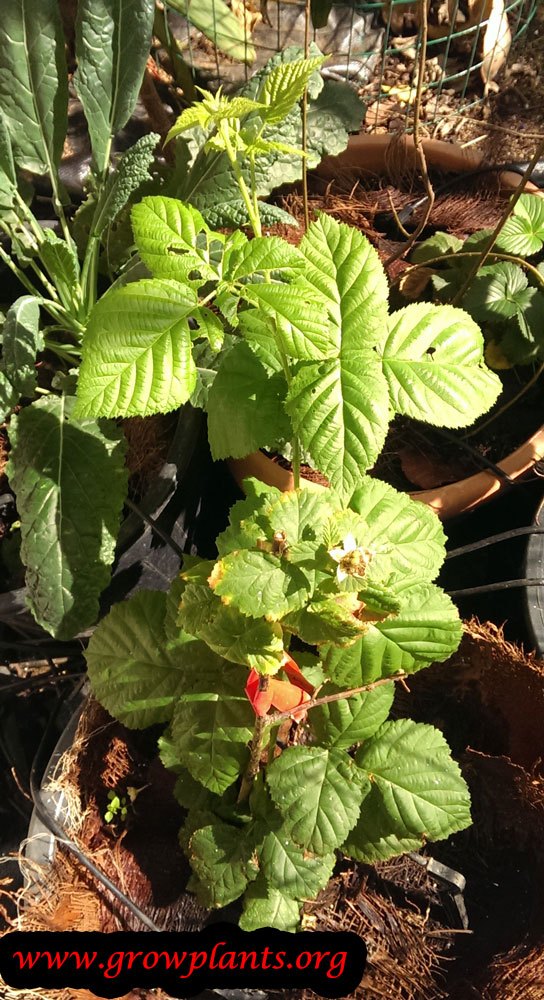
Categories
| Blooming Seasons |
|
|---|---|
| Edible Parts |
|
| Culinary uses |
|
| Flower colors |
|
| Climate |
|
| Harvest Season |
|
| Plant growing speed |
|
| Plant life-form |
|
| Plant Uses |
|
| Planting Season |
|
| Plants sun exposure |
|
| Watering plants |
|
| Hardiness zone |
|


